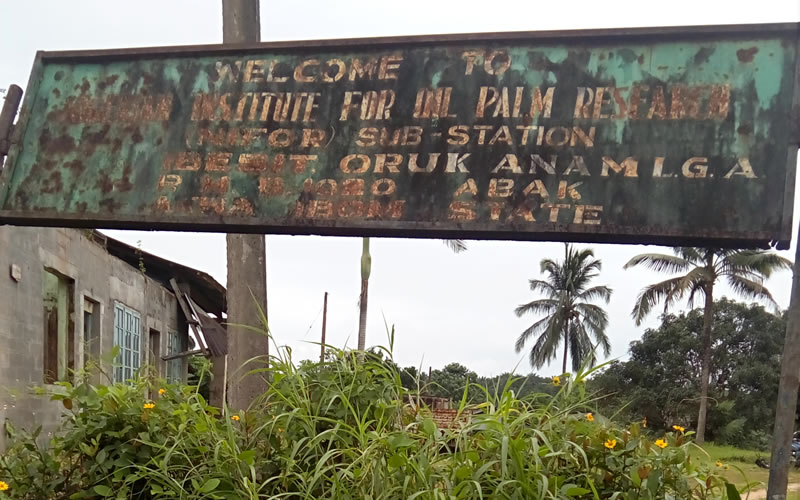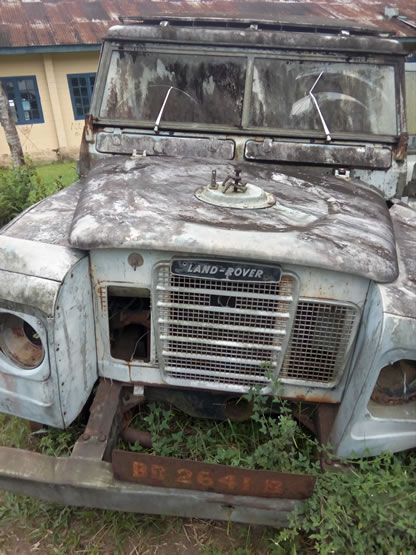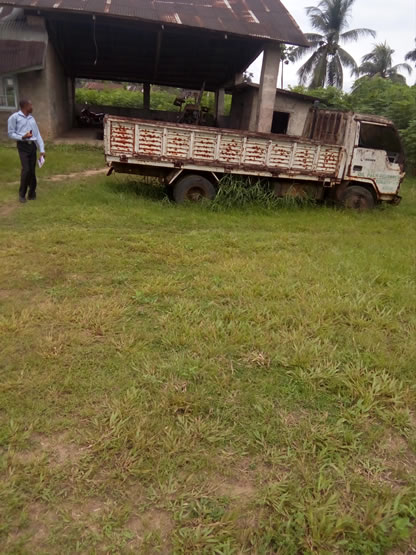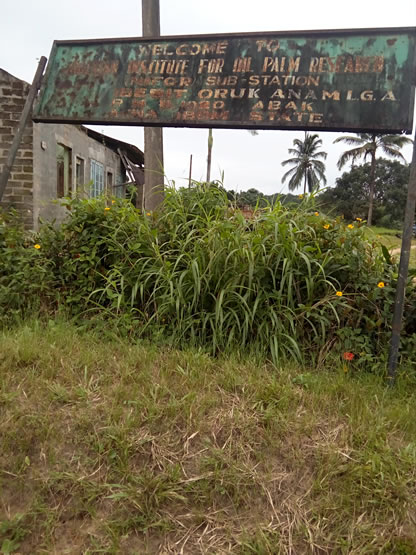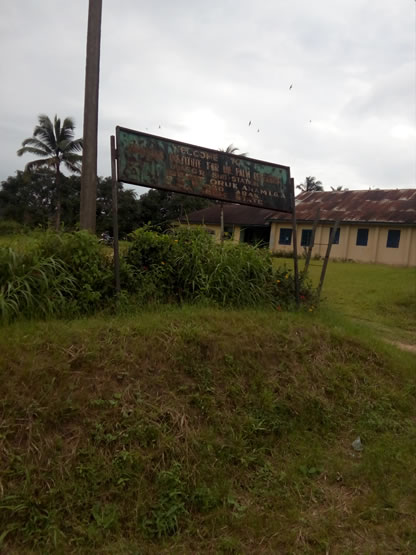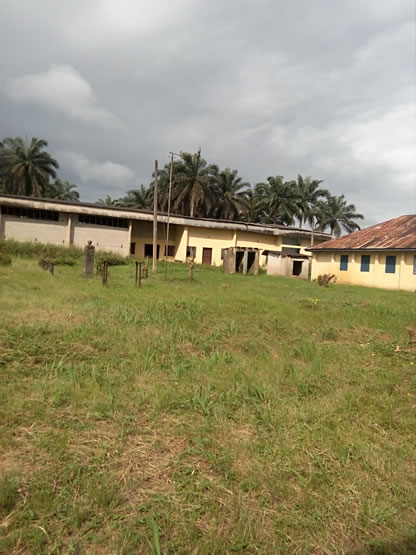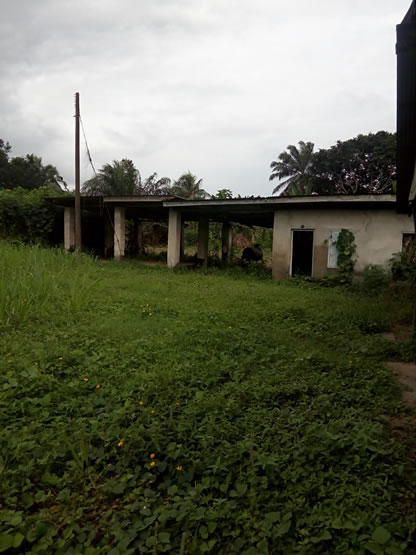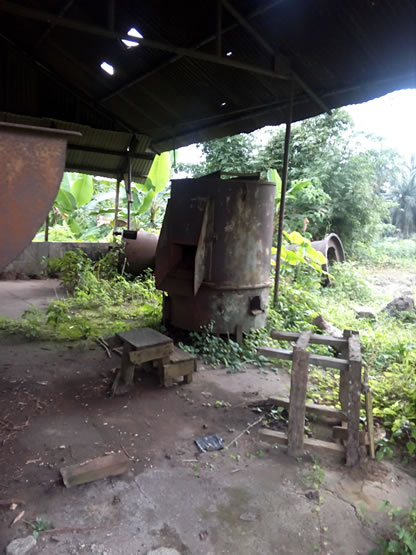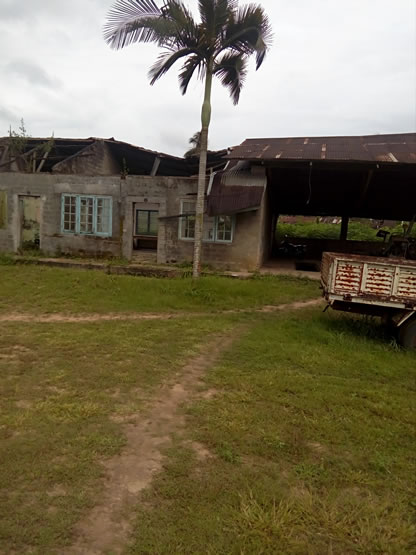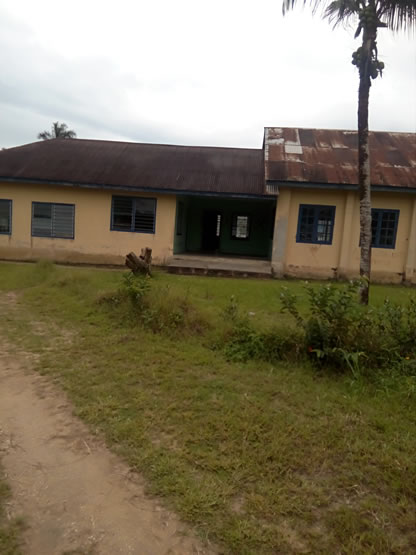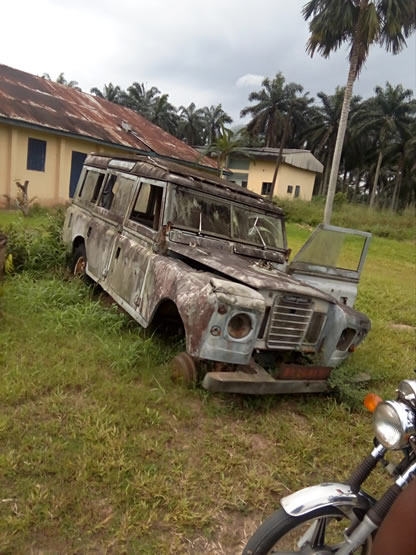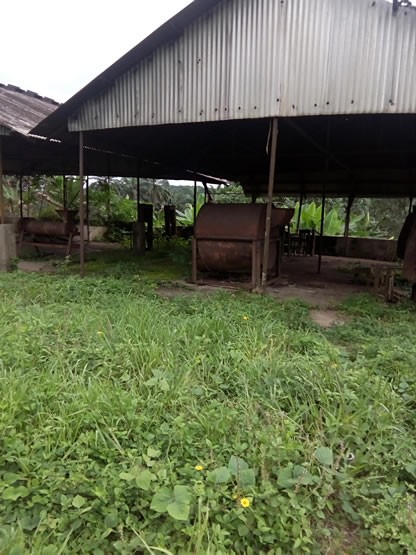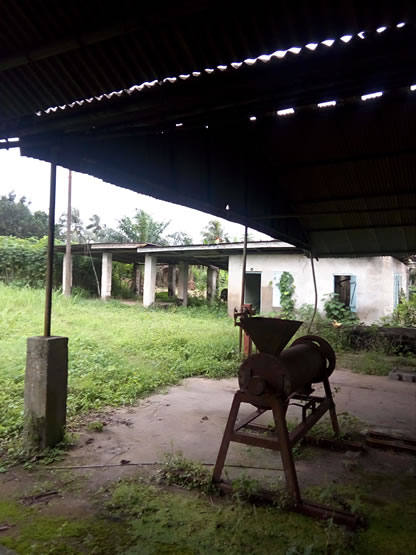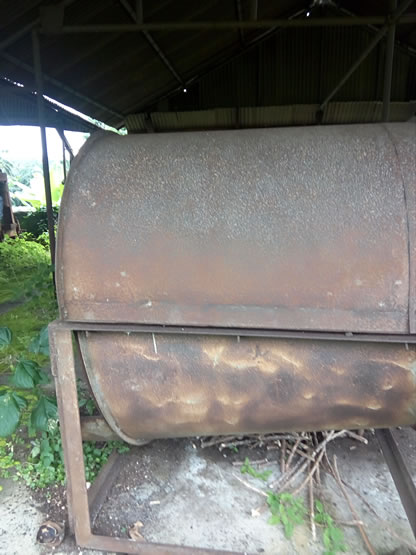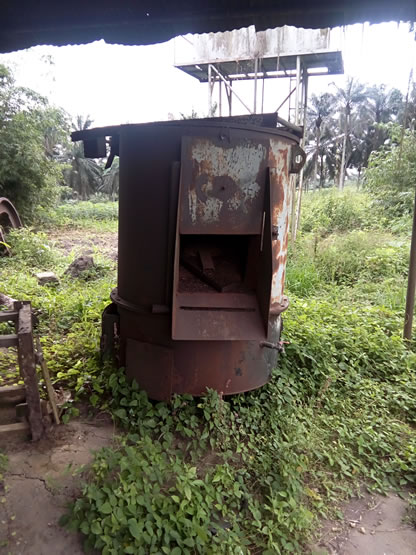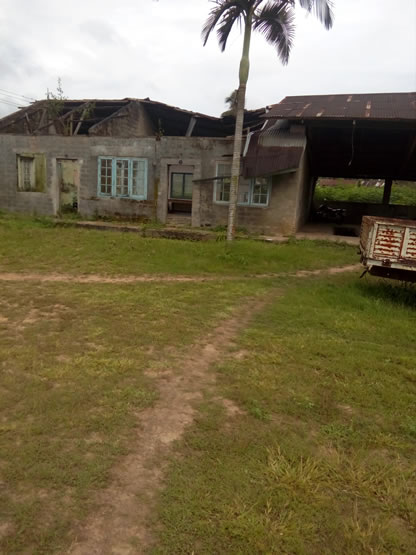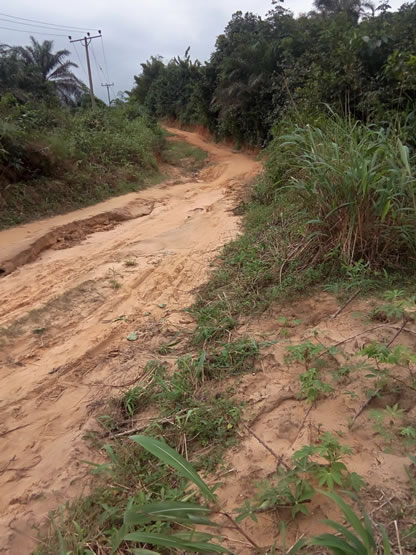The once bustling Abak Substation of Nigerian Institute for Oil Palm Research (NIFOR) in Akwa Ibom State that donated oil palm seedlings to Malaysia in 1960 is in a grim state of dilapidation and abandonment.
The 71-year-old substation with oil palm and coconut plantations spread across seven villages of Abak and Oruk Anam Local Government Areas is in a rotting state caused by perceived neglect by the Federal government occasioned by vandalisation of its property by unsuspecting persons.
StraightNews gathered that the visiting Malaysians collected the oil palm seedlings; cross pollinated them in Ikot Okpong, one of the host communities of the substation and mass produced them. Today, Malaysia is a leading palm oil exporting country in the world while Abak substation, the trailblazer is retrogressing.
The substation established in 1946 and started operations in 1947, is a parastatal of the Federal Ministry of Agriculture and Rural Development. Known initially as West African Institute for Oil Palm Research (WIFOR), the institute, which was changed to NIFOR in 1960, researches into oil palm, coconut and raffia. Benin City, Edo State is its main station with other substations in Badagry, Dutse, Delta State and Raffia Institute in Bayelsa State.
While the host communities want the institute to implement Memorandum of Understanding (MoU) entered into with them several years ago to allow peace to reign, the institute hangs to its inability to implement some tall demands in the MoU.
Consequently, the substation is embroiled in a litany of litigations, crises and accusations with the host communities, resulting in constant harassment and threats to life of some of its staffers by some irate youths from the communities, StraightNews learnt.
Again, the substation has turned to a huge site of dilapidated buildings, moribund vehicles and decrepit machineries in the abandoned mill in the sprawling hectares of oil palm and coconut trees overgrown with weeds and wild palms. Some staffers of the Institute particularly non-indigenes of the institute have fled the area for fear of attacks.
In confirming the Malaysian story over collection of palm oil seedlings from the substation, Chief Friday Jackson Ekot, 70, village head of Ikot Okpong, one of the host communities of the substation, recalled “In 1960, some Malaysians came to this village and collected oil palm seedlings from the institute. I was a young man then. They cross-pollinated there.” He pointed StraightNews to the location where they stayed and cross-pollinated the seedling and before taking the seedlings away.
“I am unhappy with the Federal government for abandoning the substation to its fate which Malaysia came and picked oil palm seedlings from, but today is a world leading exporter of palm oil to different countries including Nigeria. The World Bank has not even declared our villages as the largest producer of palm oil, but rather declared Abia State some years,” he bemoaned.
Ubong Silas, Senior Technical Officer and also the officer in-charge of the substation, who collaborated, ”Though I did not join this institute then, I heard about the story. It was true. Malaysians took palm oil production as a serious but major business, while Nigeria abandoned it and focused attention on crude oil production. Till now, Malaysians have been coming to cross breed their oil palm seedlings at either the substation or in Benin City.”
Ekot further narrated “Some government officials long ago came from Umuahia in the then defunct Eastern Nigeria and acquired hectares from us to plant oil palm trees. They planted oil palm trees, harvested and sold to members of the public. Actually, Eastern Regional government had paid compensation to the host communities and sold palm fruits to the public. Upon payment, the institute destroyed the old palm trees and planted new ones. We go there and purchase oil palm seedlings from them.”
However, the non-implementation of the disputed Memorandum of Understanding (MoU) is said to have generated a lot of created bad blood between the members of the host communities and the substation leading to unrest, suspicion and crisis. Ekot gave his side of the story “Upon NIFOR taking over from WIFOR, we expected it to also pay compensation to us. Our people then entered into MoU with the institute for the provision of tarred roads, potable water, electricity and telephone system in the affected communities. Unfortunately, NIFOR has reneged in keeping to the terms of agreement.”
The village head mentioned these villages as the host communities: Itung, Ikot Okpong, Edem Idim, Ikot Ntuen, Oruk Obong, Ekoi, Oruk Eno and Nta Urua. “In 2015, crisis erupted between the host communities and NIFOR. Some youths in the area blocked the road leading to the substation on accusation of non-implementation of MoU for the villagers. This action compelled the staffers to have abandoned the substation for more than three years. Non-indigenes left for Benin City, which is the NIFOR main station,” he reminisced.
Three years ago, the substation was enmeshed in crisis with the communities. “When the staffers fled in the heat of the crisis, the villagers took over the possession of the oil palm plantation within the area of their jurisdiction and harvested them at will. Even till now, some youths still trespass on the hectares due to the grievance with the institute,” the village head stated.
Collaborating, the 35-year-old Ukeme Emmanuel Jimmy stated “When NIFOR took over the hectares, it promised to open up rural roads, provide electricity, potable water and create gainful employment opportunities for our people. Yet, these promises have not been fulfilled.”
Jimmy, an indigene of Itung village, one of the host communities, decried that “as an unemployed graduate, I have to ply my trade as a motor cyclist. Since I was born, NIFOR used to employ people from the communities as labourers and casual workers. We have many qualified people to work there, yet they are roaming about in search of jobs in other places. The institute that should have been a source of succor to us is not helping matter.
There is a man from my village who has worked for 13 years in the substation collecting N3,000 as monthly stipend without his appointment being regularised. Is it fair to pay a family man N3,000? How does he cope with the harsh economic conditions in our society? he queried angrily.
“Apart from this, the road leading to the substation is in deplorable state. Where do they want the staffers to pass to the office? Which road will people having business to do in the place pass through? Till now, the substation will continue to give excuses. Candidly, our people are not happy with this development,” Jimmy posited.
The 40-year-old Sunday Jackson, an indigene of Ikot Okpong, said “There is MoU, which NIFOR should implement in the interest of peace and development of the communities. A situation where the substation dodges its responsibility when it comes to the MoU issue is unhealthy.”
Jackson, who is a pastor in Redeemed Church of God in Ikot Okpong, decried the reckless manner government has relegated the production of oil palm trees and other cash crops to the background in pursuit of crude oil which might not soon be patronized by most foreign countries.
Responding to the MoU issue, Silas, the officer in-charge of the substation confirmed thus “NIFOR had a MoU with them, though I did not join it then. Along the line, the people started agitation which led to a fight. The officer in-charge then, Mr. Jedepa had to leave the substation in 2010. Some stakeholders: Udo Kierian representing Oruk Anam State Constituency, Friday Iwok, representing Abak State Constituency in the state House of Assembly and other politicians came to resolve the matter. But at the end of the day, the dispute was resolved, and we resumed work.”
Silas hinted “NIFOR is a Federal Government establishment. It cannot provide a tarred road. What really happened was that some youths rose up and said that NIFOR should construct a road for them from A-Z to NIFOR premises, and supply them with boreholes and electricity. Whatever the host community demands from NIFOR should be through dialogue and not violence. When the crisis occurred, Mr. Jedepa was transferred and Mr. Abigor was posted from Benin to Abak. He held a series of meetings with village and clan heads. NIFOR said we can’t give you tarred roads, but can grade roads across the seven communities that make up the host communities, which are Itung village, Ikot Ntuen, Ikot Okpong, Edem Idim, Nto Adua, Uruk Obong and Uruk Onim Village. Obio Akpa is not included, but the people donated the land which we have the plantation.”
He observed “NIFOR took the perimeters of the road across the seven host communities. I was the head of Works then. The road was graded; Edem Idem and Itung villages got one borehole each. The officer in-charge then told them to be patient, but they kept on with their agitations that NIFOR was not employing indigenes, except casual workers and that NIFOR should convert the casual workers who had worked 15-16 years to permanent staff. Again, they wanted an indigene from the catchment area to be represented in the governing council of NIFOR. They also said in management team of NIFOR, Benin, no one from Akwa Ibom State is representing.
After three months, NIFOR management absorbed 10 casual workers as promised, including two graduates which the host communities got a slot. The late Paramount Ruler of Oruk Anam, the late Prof. Monday Owoh gave his son who is still working as a research officer in Benin. But when the 10 staff came, another problem began which led to the final closure of NIFOR. This is because they did not follow the tally numbers of the casual workers orderly; instead they handpicked people who worked for five years based on their cartel, while those that worked for 15 years as earlier agreed were exempted.”
The officer in-charge noted “So, the youths said ‘no’, due process must be followed. They pursued all the staff out of NIFOR, including workers who lived in the quarters and locked the place. After few months, properties were stolen. They vandalized computer sets, sets of furniture, pumping machine, 250 KVA generating set, removed zinc from all the renovated buildings and destroyed the European quarters occupied by the officer in-charge. Even now, I do not have furniture in my office. The substation is back to square one.”
Silas recalled “Before now, one Isaac Udofa from the host community had instituted a court case against the substation on non-payment of rent to the affected communities. According to Chief Ekot, “There is a court case pending in the Federal Appeal Court, Calabar, challenging the non-implementation of the MoU by NIFOR. The matter had already been taken to the state High Courts at Ukanafun and Abak. In the first judgment in Ukanafun, it was ruled in favour of the plaintiff (the host community) that the institute should pay compensation to the host communities. From there the matter was taken to Abak and decided in favour of the defendant (NIFOR).”
On his part, Silas admitted that there is a court against the institute “Yes, we had two issues: the first one a court case between one Isaac Udofa, the plaintiff, filed a case against NIFOR. The case was won by NIFOR in Appeal Court in 2010. The same plaintiff, Isaac came back and claimed a large portion of land, saying that it belongs to him. Again, the case was taken to court, this time it was on rent issue. He said NIFOR has not been paying rent to the true owners of the land; meanwhile, NIFOR had been paying rent to the village heads. It was about 250 pounds per annum. That was then. Each village collected the amount, which had been going on till 2010, when the crisis started. The case had been in court before the crisis which led to the closure of the substation.”
Continuing, he said “Edem Idim field was contracted so that the village heads got 40 per cent of the produce harvested, while 60 per cent went to NIFOR. The contract was to be renewed every year. That field involves all other villages and the plantation belongs to the federal government. And so, the agreement covers all. Government has a right to site any field, and then tell the village heads, this is where you will get your 40 per cent. Federal Government allocated a particular field where the village heads get their share once it is harvested, and not all the fields.”
Silas noted that “I don’t remember the suit number because the judgment is with the head of legal unit in NIFOR Benin. Yes, the issue of rent is still in Appeal Court. In the first case, Udofa, the plaintiff won at Ukanafun High Court. NIFOR had to appeal because it had been paying rent to the village heads. If you are aggrieved of not collecting what you want from government on the land you donated or leased, but what I know is that NIFOR paid money for the land.
Right now, NIFOR is not paying the rent because the case is still in court, pending when judgment will be passed. But when the plaintiff took the matter to court, the court asked him to file a response within 30 days, so that Appeal Court can fix a date for hearing. But the 30 days elapsed and he was unable to file his response; 60 days elapsed, he was unable to do same. NIFOR then went and applied to the court to use what it filed to pass judgment. That is the situation of things now, so we are still waiting to hear from Appeal Court.”
On the crisis that rocked the station, Silas said “During the crisis, we stayed at home for three years and eight months till an order came that if workers don’t resume work, we would cease to be government staff. During that period, we were still receiving our salaries. The thought of losing our jobs moved us to consult with the village and clan heads saying ‘we have stayed at home for too long, no-gain-nor- benefits, so they should allow us to resume work to enable government and other stakeholders come for mediation towards finding a lasting solution to the problems for fear of losing our jobs.”
“My appeal to the host communities is that they should stay away from NIFOR plantation. They should allow us to work. The land belongs to them. They should assist us protect the plantation, and not to trespass, like you go to offices you don’t find louvres, cables switches, so the leaders should talk to the youths to refrain from such act.”
At the moment, the substation has 40 staff and 52 casual workers.
Efforts to reach the Minister of Agriculture and Rural Development, Chief Audu Ogbeh proved abortive.

